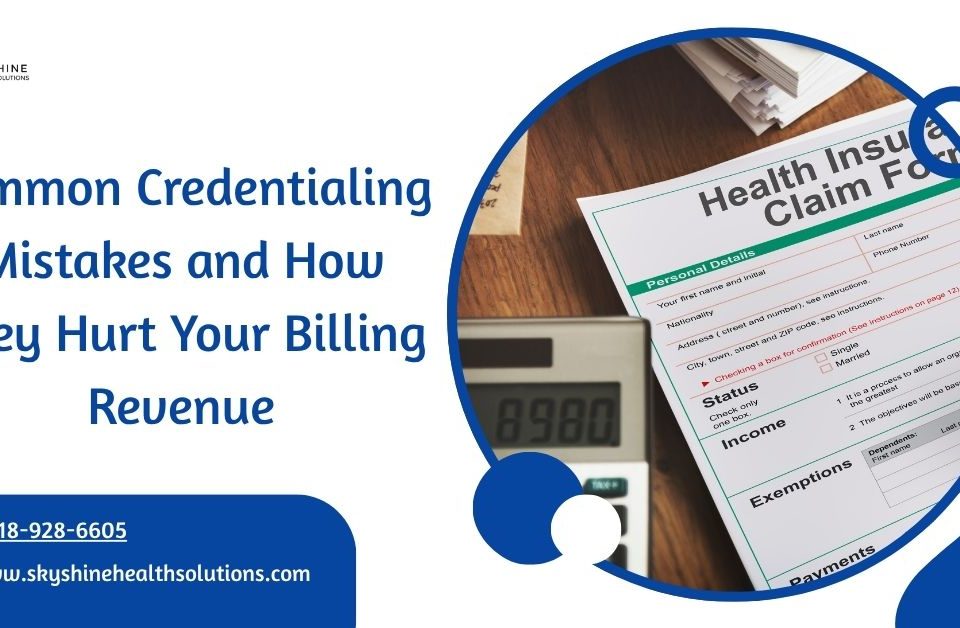
NPI Number : Essential Guide for Medical Billing (2025)
June 17, 2025
ICD-10 Updates 2026: Prep Your Practice for New Codes
June 22, 2025For small medical practices, efficient medical billing is critical to maintaining cash flow and ensuring long-term success. However, deciding to manage from outsourced vs. in-house billing can be challenging. Both options come with unique advantages and drawbacks, and the right choice depends on your practice’s size, budget, and operational goals. In this blog, we’ll explore the pros and cons of outsourced vs. in-house billing to help small practices make an informed decision.

What is In-House Medical Billing?
In-house medical billing involves hiring and training staff within your practice to handle all aspects of the billing process. This includes coding claims, submitting them to insurance companies, following up on denials, and managing patient payments. Small practices often rely on one or two dedicated billers or train existing staff to handle these tasks alongside other responsibilities.
Pros of In-House Medical Billing
-
-
-
Full Control Over Processes: With in-house billing, you have direct oversight of every step, from coding to claim submission. This allows for quick adjustments and alignment with your practice’s specific needs.
-
Immediate Access to Data: Your billing records are readily available, enabling real-time insights into revenue cycles and patient accounts.
-
Personalized Patient Interaction: In-house staff can build rapport with patients, addressing billing questions directly and fostering trust.
-
Potential Cost Savings for Small Volumes: For practices with low claim volumes, hiring a part-time biller may be more cost-effective than outsourcing fees.
-
-
Cons of In-House Medical Billing
-
-
-
High Upfront and Ongoing Costs: Hiring, training, and retaining skilled billers can be expensive. Additionally, you’ll need to invest in billing software, updates, and compliance training.
-
Staff Turnover Risks: Losing a trained biller can disrupt operations, leading to delays in claims processing and potential revenue loss.
-
Time-Intensive Management: Overseeing billing staff and staying updated on regulatory changes, like ICD-10 or CPT code updates, diverts time from patient care.
-
Error-Prone for Small Teams: Limited staff may struggle to keep up with complex coding requirements, increasing the risk of claim denials.
-
-
What is Outsourced Medical Billing?
Outsourcing medical billing involves contracting a third-party service to manage all or part of your billing process. These companies specialize in coding, claim submission, denial management, and patient collections, often using advanced software and experienced staff.
Pros of Outsourced Medical Billing
-
-
-
Access to Expertise: Outsourcing companies employ certified coders and billers who stay current with industry regulations, reducing errors and denials.
-
Cost Predictability: Many services charge a percentage of collections (typically 4-8%), eliminating the need for salaries, benefits, or software investments.
-
Improved Efficiency: Dedicated billing teams process claims faster, follow up on denials promptly, and optimize revenue cycle management.
-
Scalability: Outsourced services can adapt to your practice’s growth or seasonal fluctuations without requiring additional hires.
-
Focus on Patient Care: By offloading billing tasks, providers and staff can prioritize clinical duties and patient satisfaction.
-
-
Cons of Outsourced Medical Billing
-
-
-
Less Direct Control: Outsourcing means relying on an external team, which may lead to communication gaps or misalignment with your practice’s priorities.
-
Variable Costs: Fees based on a percentage of collections can become costly for high-volume practices, compared to fixed in-house salaries.
-
Data Security Concerns: Sharing patient data with a third party requires strict HIPAA compliance and robust cybersecurity measures.
-
Potential for Hidden Fees: Some outsourcing contracts include additional charges for services like reporting or denial appeals, impacting budgets.
-
-
Visit Skyshine Health Solutions to know we can handle medical billing for you.
Key Considerations for Small Practices
When deciding between outsourced vs. in-house billing, small practices should evaluate the following factors:
-
-
-
Claim Volume: Practices with low claim volumes may find in-house billing more affordable, while high-volume practices benefit from outsourcing’s efficiency.
-
Budget Constraints: Compare the total cost of in-house staff (salaries, software, training) versus outsourcing fees to determine affordability.
-
Staff Expertise: Assess whether your current team has the skills and time to manage billing effectively or if outsourcing to experts is more practical.
-
Compliance Needs: Ensure either option aligns with HIPAA regulations and stays updated on coding changes, like the 2026 ICD-10-CM updates.
-
Practice Goals: If growth is a priority, outsourcing offers scalability without the need to hire additional staff.
-
-
Real-World Example
Consider a small pediatric practice with two physicians and 50 claims per week. Initially, they managed billing in-house with a part-time biller earning $25/hour. However, frequent claim denials due to coding errors reduced reimbursements by 15%. After switching to an outsourced service charging 6% of collections, the practice saw a 20% increase in revenue due to fewer denials and faster claim processing. While outsourcing fees were slightly higher than the biller’s salary, the improved cash flow and reduced administrative burden justified the switch.

Making the Right Choice for Your Practice
There’s no one-size-fits-all solution for medical billing. Small practices must weigh the trade-offs of control, cost, and efficiency to find the best fit. If you value hands-on oversight and have a manageable claim volume, in-house billing may work well. However, if you’re looking to streamline operations and leverage expert knowledge, outsourcing could be the key to boosting revenue and reducing stress.

Visit our blog Medical Billing: Navigating Medicare and Medicaid Rules for more insights.
Have Questions on medical billing? Visit Medical Billing FAQs















